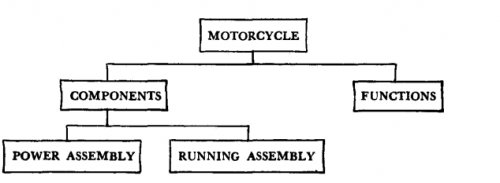He thinks I’m working on parts. I’m working on concepts.
The following quote is from Zen and the Art of Motorcycle Maintenance by Robert Pirsig. (The John mentioned is the protagonist’s buddy who wants to escape modern technological life via a motorcycle he deigns to tune-up):
Precision instruments are designed to achieve an idea, dimensional precision, whose perfection is impossible. There is no perfectly shaped part of the motorcycle and never will be, but when you come as close as these instruments take you, remarkable things happen, and you go flying across the countryside under a power that would be called magic if it were not so completely rational in every way. It’s the understanding of this rational intellectual idea that’s fundamental. John looks at the motorcycle and he sees steel in various shapesand has negative feelings about these steel shapes and turns off the whole thing. I look at the shapes of the steel now and I see ideas. He thinks I’m working on parts. I’m working on concepts.
I was talking about these concepts yesterday when I said that a motorcycle can be divided according to its components and according to its functions. When I said that suddenly I created a set of boxes with the following arrangement:
And when I said the components may be subdivided into a power assembly and a running assembly, suddenly appear some more little boxes:
And you see that every time I made a further division, up came more boxes based on these divisions until I had a huge pyramid of boxes. Finally you see that while I was splitting the cycle up into finer and finer pieces, I was also building a structure.
This structure of concepts is formally called a hierarchy and since ancient times has been a basic structure for all Western knowledge. Kingdoms, empires, churches, armies have all been structured into hierarchies. Modern businesses are so structured. Tables of contents of reference material are so structured, mechanical assemblies, computer software, all scientific and technical knowledge is so structured—so much so that in some fields such as biology, the hierarchy of kingdom-phylum-class-order-family-genus-species is almost an icon.
The box “motorcycle” contains the boxes “components” and “functions.” The box “components” contains the boxes “power assembly” and “running assembly,” and so on. There are many other kinds of structures produced by other operators such as “causes” which produce long chain structures of the form, “A causes B which causes C which causes D,” and so on. A functional description of the motorcycle uses this structure. The operator’s “exists,” “equals,” and “implies” produce still other structures. These structures are normally interrelated in patterns and paths so complex and so enormous no one person can understand more than a small part of them in his lifetime. The overall name of these interrelated structures, the genus of which the hierarchy of containment and structure of causation are just species, is system. The motorcycle is a system. A real system.
To speak of certain government and establishment institutions as “the system” is to speak correctly, since these organizations are founded upon the same structural conceptual relationships as a motorcycle. They are sustained by structural relationships even when they have lost all other meaning and purpose. People arrive at a factory and perform a totally meaningless task from eight to five without question because the structure demands that it be that way. There’s no villain, no “mean guys’ who wants them to live meaningless lives, it’s just that the structure, the system demands it and no one is willing to take on the formidable task of changing the structure just because it is meaningless.
But to tear down a factory or to revolt against a government or to avoid repair of a motorcycle because it is a system is to attack effects rather than causes; and as long as the attack is upon effects only, no change is possible. The true system, the real system, is our present construction of systematic thought itself, rationality itself, and if a factory is torn down but the rationality which produced it is left standing, then that rationality will simply produce another factory. If a revolution destroys a systematic government, but the systematic patterns of thought that produced that government are left intact, then those patterns will repeat themselves in the succeeding government. There’s so much talk about the system. And so little understanding.

